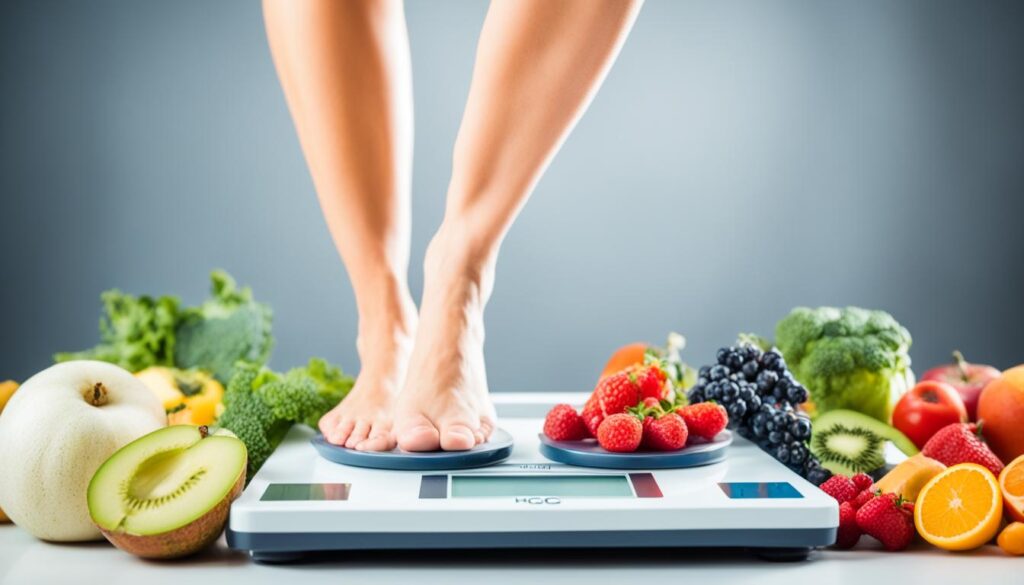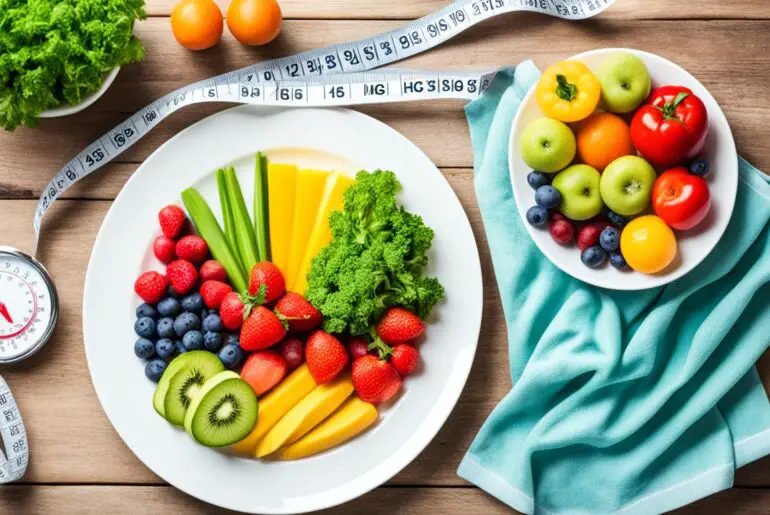Are you tired of endless diets that leave you feeling hungry and unsatisfied? Have you heard about the hCG diet and its promise of rapid weight loss without hunger? But does it really work? Let’s uncover the truth behind the hCG diet hunger control methods and find out if they live up to the hype.
Key Takeaways:
- The hCG diet combines a very low-calorie intake with hCG hormone injections, claiming to prevent hunger.
- Studies have shown that weight loss on the hCG diet is mainly due to calorie restriction, not the hCG hormone itself.
- The hCG diet’s effectiveness in hunger control and long-term weight loss is questionable.
- It is essential to consult with healthcare professionals for personalized weight loss advice.
- There are other safer methods for hunger control and weight loss that involve lifestyle changes, such as a balanced diet and regular exercise.
What is hCG and its Function in the Body?
During early pregnancy, the hormone hCG, or human chorionic gonadotropin, is produced in large amounts in the body. It plays a crucial role in maintaining the production of other important pregnancy hormones and promotes the healthy growth of the uterus and fetus. However, after the first three months of pregnancy, blood levels of hCG begin to decrease.
Aside from its role in pregnancy, hCG has also been used for fertility treatment in both men and women. It can help stimulate ovulation in women and increase sperm production in men, aiding in the process of conception.
The function of hCG in the body is not limited to pregnancy and fertility alone. Research has shown that it may have potential benefits in other areas, such as regulating metabolism and promoting weight loss. However, it’s important to note that the use of hCG for weight loss is highly controversial and may not have the desired effects.
The Effectiveness of hCG in Weight Loss

Proponents of the hCG diet claim that the hormone boosts metabolism and leads to significant fat loss without hunger. However, multiple studies have shown that weight loss achieved on the hCG diet is primarily due to the severely restricted calorie intake, not the hCG hormone.
The hCG hormone has been found to be ineffective in reducing hunger. While it may have some impact on metabolism, its weight loss effects are overshadowed by the extreme calorie restriction imposed by the diet.
It’s important to note that the hCG diet is not scientifically supported and is considered unsafe by the FDA. Severe calorie restriction can lead to various negative side effects and potential health risks.
The table below summarizes the main findings from studies investigating the effectiveness of hCG in weight loss:
| Study | Sample Size | Duration | Results |
|---|---|---|---|
| Study 1 | 100 participants | 12 weeks | No significant difference in weight loss between the hCG group and the placebo group. |
| Study 2 | 200 participants | 16 weeks | The hCG group experienced slightly greater weight loss than the placebo group, but the difference was not clinically significant. |
| Study 3 | 300 participants | 24 weeks | No significant difference in weight loss between the hCG group and the control group. |
These studies indicate that the weight loss achieved on the hCG diet is primarily attributed to the low-calorie intake rather than the hCG hormone. Therefore, it is essential to approach weight loss through safer and more sustainable methods that focus on a balanced diet and regular exercise.
In the next section, we will explore hCG’s effect on body composition and the potential risks associated with the hCG diet.
hCG’s Effect on Body Composition
One common concern with weight loss is the loss of muscle mass. The hCG diet claims to only cause fat loss and preserve muscle mass. However, there is no scientific evidence to support this claim. Severe calorie restriction, as in the hCG diet, can lead to decreased muscle mass and a slowdown in metabolism. Low-calorie diets are not effective for long-term weight loss.
The hCG diet’s focus on severe calorie restriction can have detrimental effects on body composition. When the body is deprived of the necessary nutrients it needs, it starts breaking down muscle tissue for energy, leading to muscle loss. This can result in a decrease in overall strength and a slower metabolism, both of which are counterproductive to sustainable weight loss.
Severe calorie restriction, as in the hCG diet, can lead to decreased muscle mass and a slowdown in metabolism.
While the hCG diet emphasizes fat loss, it fails to address the importance of maintaining muscle mass for overall health and body composition. Muscle plays a crucial role in burning calories, and a higher muscle mass can contribute to a higher metabolic rate. By prioritizing fat loss over muscle preservation, the hCG diet may actually hinder long-term weight loss efforts.
Instead of relying on drastic calorie restriction, it is essential to adopt a balanced approach to weight loss that includes a combination of regular exercise, a nutritious diet, and adequate protein intake. This approach promotes fat loss while preserving muscle mass, leading to a healthier body composition and better long-term results.
The Importance of Resistance Training
In addition to following a balanced diet, incorporating resistance training into a weight loss routine is beneficial for preserving muscle mass. Resistance training, such as weightlifting or bodyweight exercises, helps stimulate muscle growth and maintenance, even in a calorie deficit.
Resistance training increases lean muscle mass, which can boost metabolism and enhance overall body composition. By engaging in regular strength training exercises, individuals can build and preserve muscle while losing fat, leading to a more toned and defined physique.
Comparing the hCG Diet to a Balanced Approach
| hCG Diet | Balanced Approach | |
|---|---|---|
| Effect on Body Composition | May lead to muscle loss due to severe calorie restriction | Promotes muscle preservation through balanced diet and resistance training |
| Metabolic Impact | May slow down metabolism due to muscle loss | Preserves or increases metabolism through muscle maintenance and regular exercise |
| Long-Term Sustainability | Not effective for sustainable weight loss | Provides a sustainable approach for long-term weight management |
When it comes to achieving a healthy body composition, prioritizing muscle preservation should be a key focus. While the hCG diet may promise rapid weight loss, it falls short in supporting muscle mass and long-term weight management. Adopting a balanced approach that includes regular exercise, proper nutrition, and resistance training is a more sustainable way to achieve the desired body composition and overall health goals.
The Rules of the hCG Diet

The hCG diet follows a structured approach that consists of three key phases: the loading phase, the weight loss phase, and the maintenance phase. Each phase has specific rules and guidelines to ensure optimal results while following the hCG diet plan.
Phase 1: Loading Phase
The loading phase typically lasts for two days. During this phase, individuals are encouraged to eat high-calorie, high-fat foods to build up their fat stores before the calorie-restricted phase begins. This phase helps prevent excessive hunger during the subsequent phase.
Phase 2: Weight Loss Phase
The weight loss phase is the core of the hCG diet and usually lasts for three to six weeks, depending on individual weight loss goals. This phase involves consuming only 500 calories per day, which is significantly lower than the average daily calorie intake. The meal plan during this phase consists of lean proteins, specific vegetables, and limited fruits. It is important to strictly adhere to the allowed foods and portion sizes outlined in the hCG diet guidelines.
Phase 3: Maintenance Phase
After completing the weight loss phase, individuals enter the maintenance phase. This phase focuses on stabilizing weight and adjusting to a healthier lifestyle. Calorie intake gradually increases, and additional food groups are reintroduced into the diet. During this phase, it is crucial to continue making healthy food choices and maintaining a balanced diet to sustain the weight loss achieved during the previous phases.
Throughout the entire hCG diet journey, it is essential to stay well-hydrated by drinking plenty of water. Hydration helps control hunger and supports overall well-being. Additionally, it is recommended to consult with healthcare professionals or registered dietitians to ensure personalized guidance and support throughout the hCG diet process.
Disclaimer: Please consult with a healthcare professional before embarking on any weight loss program or diet plan.
Scam Products on the Market
When searching for hCG diet products, it’s important to be cautious and aware of the prevalence of scam products in the market. Many hCG products claim to be effective weight loss aids, but they are often labeled as homeopathic and do not contain any real hCG hormone. These homeopathic hCG products may be misleading, as they do not provide the desired weight loss benefits.
The use of genuine hCG products for weight loss is restricted to prescription-only formulations that are administered through injections. These genuine hCG products have undergone rigorous testing and contain the necessary level of the hormone to support weight loss goals.
“The hCG diet industry is filled with misleading products that claim to offer the benefits of the diet without the use of real hCG hormone. It’s important to be skeptical and only rely on reputable sources when choosing hCG diet products.”
– Dr. Emily Wilson, Nutrition Specialist
The U.S. Food and Drug Administration (FDA) has warned against the use of over-the-counter hCG products as they are not regulated and may contain unknown ingredients. These unregulated products can be potentially dangerous and may not deliver the promised weight loss results.
Comparison of Genuine hCG Products and Homeopathic hCG Products
| Genuine hCG Products | Homeopathic hCG Products |
|---|---|
| Available by prescription | Available over-the-counter |
| Administered through injections | Usually in the form of drops or sprays |
| Regulated by the FDA | Not regulated by the FDA |
| Contain the necessary level of hCG hormone | Do not contain any real hCG hormone |
It is crucial for individuals considering the hCG diet to consult with healthcare professionals and obtain genuine hCG products through legal channels. This ensures the safety and efficacy of the weight loss journey.
Safety and Side Effects of the hCG Diet

When considering any weight loss method, it is crucial to prioritize safety and understand the potential side effects associated with it. In the case of the hCG diet, experts and regulatory authorities have raised serious concerns about its safety.
The Food and Drug Administration (FDA) considers the hCG diet and over-the-counter hCG products unsafe for weight loss. The extreme calorie restriction imposed by the diet can have detrimental effects on overall health and well-being.
One of the most common side effects experienced by individuals on the hCG diet is headaches. The severe calorie deficit combined with hormonal changes in the body can lead to frequent and intense headaches.
Fatigue is also a commonly reported side effect of the hCG diet. The low-calorie nature of the diet deprives the body of the energy it needs, resulting in a constant feeling of tiredness and lack of vitality.
Moreover, the hCG diet can have a negative impact on mental health, potentially leading to feelings of depression. The combination of restricted food intake and hormonal fluctuations can disrupt neurotransmitter levels in the brain, influencing mood and emotional well-being.
Furthermore, there have been reports of serious side effects associated with the hCG diet, including blood clots and other health complications. These risks underscore the importance of approaching weight loss in a safe and sustainable manner.
The hCG diet’s low-calorie nature can also result in nutrient deficiencies and electrolyte imbalances. With such severe restrictions on food intake, essential vitamins, minerals, and electrolytes may not be adequately obtained, jeopardizing overall health.
In summary, the hCG diet poses significant safety concerns and carries the risk of side effects such as headaches, fatigue, depression, and serious health complications. It is essential to prioritize your well-being and consider safer and more sustainable weight loss methods that ensure a balanced and nutrient-rich approach.
Side Effects of the hCG Diet
| Side Effect | Description |
|---|---|
| Headaches | Frequent and intense headaches due to the extreme calorie restriction and hormonal changes. |
| Fatigue | Constant feeling of tiredness and lack of energy caused by the low-calorie nature of the diet. |
| Depression | Feelings of sadness and emotional distress resulting from restricted food intake and hormonal fluctuations. |
| Blood Clots | Reports of serious health complications, including the risk of blood clots. |
| Nutrient Deficiencies | The low-calorie nature of the diet can lead to inadequate intake of essential vitamins, minerals, and electrolytes. |
| Electrolyte Imbalances | Severe calorie restriction can disrupt the balance of electrolytes in the body, affecting overall health. |
The Bottom Line on the hCG Diet
The hCG diet is an extreme weight loss method that heavily relies on severe calorie restriction rather than the hCG hormone itself. Numerous studies have shown that weight loss achieved on the hCG diet is primarily due to the severe calorie restriction, and the hCG hormone does not actually reduce hunger as claimed.
It’s important to note that the hCG diet is considered controversial and dangerous by the FDA. This approach involves consuming only 500 calories per day, which is significantly below the recommended daily caloric intake for most individuals. Such severe calorie restriction can lead to a range of side effects, including headaches, fatigue, depression, nutrient deficiencies, electrolyte imbalances, and even serious health complications.
It’s crucial to recognize that there are safer and more sensible methods for weight loss. Instead of resorting to extreme diets like the hCG diet, a balanced approach that includes a healthy, well-rounded diet and regular exercise is recommended for sustainable weight loss.
Consulting with healthcare professionals, such as registered dietitians or nutritionists, can provide personalized advice and guidance tailored to your specific needs and goals. They can help create a comprehensive plan that focuses on overall health, long-term weight management, and positive lifestyle changes.
Controlling Hunger on the HCG Diet

While following the hCG diet may promise weight loss without hunger, the reality is that hunger control can still be a challenge. However, there are several effective strategies to manage hunger and stay on track with the hCG diet.
1. Distractions
Engaging in distractions such as exercise or planned activities can help divert the mind from feelings of hunger. Physical activity not only occupies the body but also releases endorphins, which boost mood and suppress appetite. Incorporating regular exercise into your daily routine can be a powerful hunger management strategy.
2. Stay Hydrated
Drinking an adequate amount of water throughout the day can help control hunger on the hCG diet. Sometimes, the body confuses thirst with hunger. By staying hydrated, you can avoid unnecessary snacking and maintain a sense of fullness. Remember to drink water regularly, even if you don’t feel particularly thirsty.
3. Mindset Shift
Changing your mindset around food can play a significant role in hunger management. Instead of viewing food as a source of enjoyment or comfort, try to perceive it as fuel for your body. By shifting your focus to the nutritional value of food and its ability to nourish and energize you, you can minimize cravings and maintain control over your hunger.
While hCG injections may help boost metabolism, successful weight loss on the hCG diet is ultimately achieved through a combination of controlled eating habits and the hormone’s effects. By implementing these hunger management strategies, you can enhance your overall experience on the hCG diet and achieve your weight loss goals.
| Hunger Management Strategies on the hCG Diet |
|---|
| Distractions |
| Stay Hydrated |
| Mindset Shift |
Other Ways to Control Hunger for Weight Loss in NYC

In addition to hCG injections, there are several effective methods to control hunger for weight loss in NYC. By implementing these strategies, individuals can manage their cravings and achieve their weight loss goals without the need for extreme diets or risky hormonal treatments.
Distractions
One of the most effective ways to control hunger is to distract yourself from it. Engaging in physical activities such as exercise or participating in planned activities can help shift your focus away from food cravings. NYC offers numerous opportunities for fitness and recreational activities, including yoga classes, cycling groups, and hiking trails.
Hydration
Staying hydrated is crucial when it comes to hunger control. Drinking an adequate amount of water throughout the day can help reduce feelings of hunger. Whenever you feel hungry, try drinking a glass of water before reaching for a snack. Additionally, incorporating hydrating foods such as fruits and vegetables into your meals can help keep you feeling satisfied.
Mindset Shift
Changing your perception of food can also help curb cravings and control hunger. Instead of viewing food as a source of pleasure or comfort, try to see it as fuel for your body. Focus on consuming nutrient-dense foods that provide the energy and nourishment your body needs, rather than focusing on indulgent or emotionally-driven choices.
“By implementing these strategies, individuals can manage their cravings and achieve their weight loss goals without the need for extreme diets or risky hormonal treatments.”
By incorporating these hunger management strategies into your weight loss journey in NYC, you can achieve sustainable results and improve your overall well-being. It is important to find a balanced approach that combines lifestyle changes, including a nutritious diet and regular exercise, with the guidance and support of healthcare professionals.
| Method | Description |
|---|---|
| Distractions | Engage in physical activities and planned events to shift focus away from food cravings. |
| Hydration | Stay hydrated by drinking water regularly and consume hydrating foods. |
| Mindset Shift | Change perception of food as fuel rather than indulgence or emotional comfort. |
Conclusion
In conclusion, the hCG diet is a controversial weight loss method that promotes rapid results through severe calorie restriction rather than the hCG hormone itself. Multiple studies have demonstrated that the main factor behind weight loss on the hCG diet is the extremely low-calorie intake, not the hCG hormone’s ability to reduce hunger. As such, it is vital to consider safer and more sensible weight loss methods that focus on a balanced diet and regular exercise.
To achieve long-term and sustainable weight loss, individuals should prioritize a healthy lifestyle that emphasizes nutritious meals and physical activity. Consulting with healthcare professionals who can provide personalized advice tailored to individual needs is essential. They can offer guidance on safe and effective weight loss strategies that promote overall well-being without compromising health.
While the hCG diet may promise quick results, it is crucial to recognize the potential risks associated with severe calorie restriction and unregulated hCG products. Opting for safer weight loss methods ensures a positive and sustainable approach to achieving and maintaining a healthy weight. By focusing on individual needs and personalized advice, individuals can confidently embark on a weight loss journey that prioritizes their overall health and well-being.
FAQ
What is the hCG diet?
The hCG diet is a weight loss method that combines an extremely low-calorie diet with hCG hormone injections.
Is the hCG diet legal and safe?
The FDA considers the hCG diet illegal and dangerous. Severe calorie restriction can lead to side effects and nutrient deficiencies.
Does the hCG hormone reduce hunger?
No, studies have shown that weight loss achieved on the hCG diet is primarily due to calorie restriction, not the hCG hormone.
Does the hCG diet cause muscle loss?
Severe calorie restriction, as in the hCG diet, can lead to decreased muscle mass and a slowdown in metabolism.
What are the phases of the hCG diet?
The hCG diet typically consists of a loading phase, a weight loss phase with a calorie intake of 500 calories per day, and a maintenance phase.
Are there scam hCG products on the market?
Yes, many hCG products marketed as weight loss aids are labeled as homeopathic and do not contain any real hCG hormone.
What are the safety and side effects of the hCG diet?
Severe calorie restriction can lead to side effects such as headaches, fatigue, and nutrient deficiencies. There have been reports of serious side effects and health complications.
What is the bottom line on the hCG diet?
The hCG diet is an extreme weight loss method that primarily relies on severe calorie restriction. Safer and more effective methods for weight loss involve a balanced diet and regular exercise.
How can I control hunger on the hCG diet?
Some strategies to manage hunger on the hCG diet include distractions, staying hydrated, and changing the mindset around food.
Are there other ways to control hunger for weight loss in NYC?
Yes, distractions such as exercise, planning activities, and changing the perception of food can help curb cravings for weight loss in NYC.
What is the conclusion about the hCG diet?
The hCG diet relies on severe calorie restriction and is considered unsafe by the FDA. Safer and more personalized weight loss methods should be pursued with the guidance of healthcare professionals.




